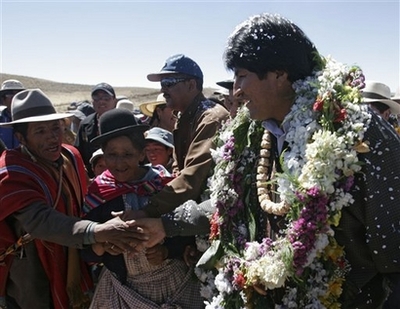Bolivian state begins key, and defiant, autonomy vote
(Agencies)
Updated: 2008-05-04 23:21
Updated: 2008-05-04 23:21
SANTA CRUZ, Bolivia -- Indigenous socialism clashed with global capitalism on Sunday as residents of this self-reliant flatland state voted on an autonomy referendum whose likely passage is seen as a rebuke to the country's leftist president.
|
|
Minor scuffles were reported in the outskirts of Santa Cruz's namesake capital shortly after the polls opened. Pro-autonomy groups battled backers of President Evo Morales, who were trying to halt the vote with sticks and rocks. Scattered injuries were reported.
"We won't let them stop this vote, because there are so many of us that want to be free," said 26-year-old autonomy supporter Ivan Morales, brandishing a tree branch in front of a cardboard voting booth after a brief street fight in Plan 3000, a poor pro-government neighborhood.
Evo Morales, Bolivia's first Indian president, has seen his vision of a communal state ruled by traditional Andean values face fierce opposition in the eastern lowlands, where freewheeling global capitalism rules.
Santa Cruz state leaders want autonomy to keep a bigger slice of the state's key natural gas revenues while protecting their soy plantations and cattle ranches from Morales' plan to redistribute land to the poor.
But Morales needs a strong central government to spread Santa Cruz's wealth to the rest of South America's poorest country.
Both sides dismissed concerns by some international observers that the vote would drive a bitterly divided Bolivia into violence.
|
||
|
||
|
|
|
|



